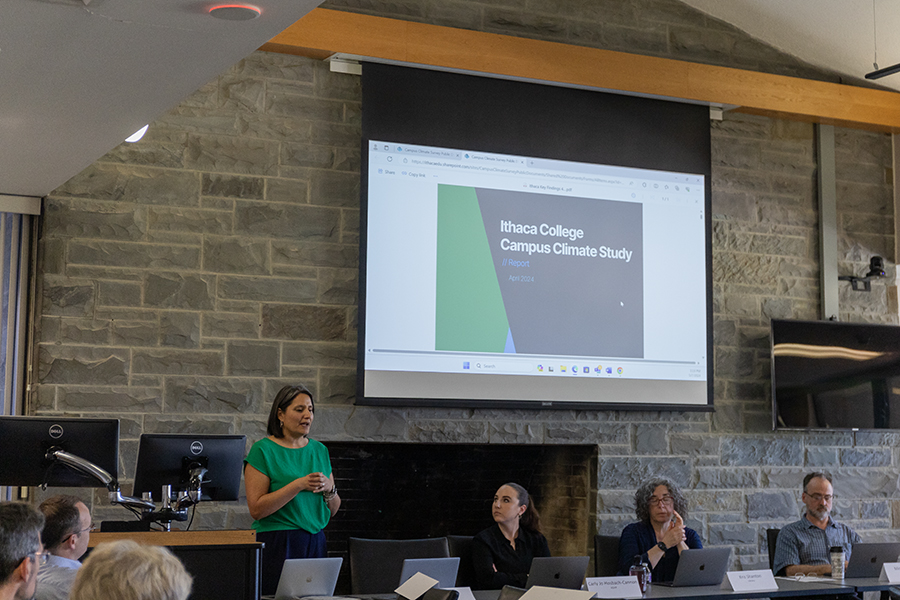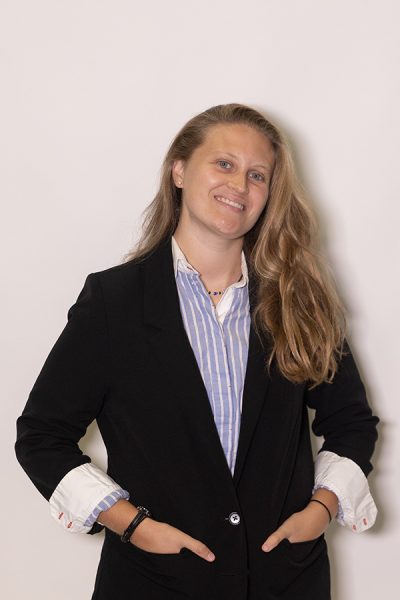The Ithaca College Faculty Council met May 7 with new members of the council in attendance. The new and continuing members voted on the Faculty Council Executive Committee’s 2024-25 chairperson, vice chairperson, secretary, Academic Policies Committee liaison and two “at large” Academic Policies Committee liaisons.
Continuing and leaving members of the council voted David Gondek, assistant professor in the Department of Biology, as next year’s FCEC chairperson and Carly Jo Hosbach-Cannon, associate professor and graduate program chair in the Department of Speech Language Pathology and Audiology, as vice chairperson as well as the APC Liaison. Music librarian Kristina Shanton and Michael Trotti, professor and legal studies coordinator in the Department of History, were voted as the liaison’s two at-large positions. All votes were unanimous.
Continuing members of the faculty council also had the chance to vote on the Academic Policies Committee Policy Subcommittee membership. Members of the APC help to review changes in current academic programs, courses and submissions of new programs and courses. Tatiana Patrone, associate professor in the Department of Philosophy and Religion, won the election for the APC subcommittee with 63% of the vote. The continuing members also voted Khyle Wooten, assistant professor in the Department of Music Performance, into the Parking and Traffic Appeals Board with 66.67% of the vote.
Campus Climate Survey follow-up
The council also heard from Belisa González, dean of faculty equity, inclusion, and belonging and co-chair of the Campus Climate Committee, who spoke about a follow-up with the Rankin Climate team that collected data for the Campus Climate Survey.
González said that there were some slight errors in the slide deck where some population data did not add up to 20%. She said the errors will be corrected and updated on the Campus Climate website.
“I will say this doesn’t change any of the major findings … or any of the groups that we’re focusing on,” González said.
The committee has reached out to the Rankin group to ask other follow-up questions, but González said she has not heard back yet.
The committee will also be hosting additional sessions about the results of the Campus Climate Survey in Fall 2024. González said the sessions will be available in separate groups for faculty, students and staff, similar to the ones that took place April 30.
“The idea behind those groups was to ask, ‘Where would you like us to dig a little deeper?’” González said. “I’m hoping we’re going to be able to tease out some of the findings that people found most interesting.”
Provost Report
The council also heard the provost’s report from Melanie Stein, provost and senior vice president for academic affairs. Stein said anyone attending the Spring 2024 commencement in the Athletics and Events Center must purchase tickets.
“I want to encourage faculty to come to commencement,” Stein said. “This is the year of students who did not have a high school graduation, and we want everyone to have a positive experience.”
Stein also said faculty will need to RSVP and tickets will be sent electronically. She said information will be sent out in an email May 13. Stein also said tickets will not be mandatory to attend the hooding ceremony.
“As we’re all well aware of what’s happening across the nation, it’s hard to predict what’s going to happen,” Stein said. “We are one of two higher educational institutions in Ithaca. [The college’s commencement ceremony] is going to go first and we want to do everything we can to have a really positive experience.”
Grade Policy revision
The Faculty Council reviewed the APC’s Satisfactory/D/Fail policy. The policy allows students to choose courses that are not required for their major or minor to make the course S/D/F. Professors do not know when students have made this change and will assign a letter grade ranging between an A or a D to the student. Grades that are between an “A” to a “C-” will be converted to satisfactory and will not be counted into the student’s grade point average. However, letter grades between a “D” and an “F” will be calculated into the student’s GPA.
The council voted on a change to the language of the policy. The original language stated that students must complete and submit an S/D/F form to the registrar’s office by the end of the third week of classes in the semester that the S/D/F credit is being taken. It also stated that students can rescind the S/D/F election until the 10th week of classes.
The revised language extends the S/D/F form deadline to the end of the 10th week of classes. However, the revision did not include the time frame that students have to be able to rescind the S/D/F credit.
Trotti said the revision of the policy can lead students to thinking differently about their academic work.
“This is a new idea of how people might be approaching classes,” Trotti said. “Is this being kind? It seems like that’s what the idea is, for people who get overwhelmed and have overloaded themselves to give them an option for something not to be a W on their transcript. But then how does this change the way students are thinking about their workload and their commitment to classes?”
The council decided to approve the revision in a 17-4 vote. The council also decided to get clarity from the APC about whether the time frame for rescinding the S/D/F credit would be included in the revision.
Student Statement Subcommittee
David Hajjar, associate professor in the Department of Speech Language Pathology and Audiology, and Paula Murray Cole, associate professor in the Department of Theatre and Dance Performance, spoke to the Faculty Council about standardizing Likert scales and questions in student statements. Likert scales measure the extent to which someone agrees with a statement, from low to high.
The council decided to further postpone a vote on accepting the standardization of a five-point Likert scale on student statements.
The council also discussed standardizing questions in student statements. Gondek said the Student Governance Council said it liked open-response questions better than Likert scale or multiple choice questions.
Hajjar said faculty should choose the questions they believe will be the most helpful for getting constructive feedback and said reflective questions may be most useful. Hajjar also said the subcommittee will further discuss the standardization of student statement questions in Fall 2024.
“What is most helpful?” Hajjar said. “What have you found most helpful in terms of the types of questions that have been on student statements? What are those questions whether they’re open-ended or Likert scale questions that you have perhaps received the most useful feedback from?”















